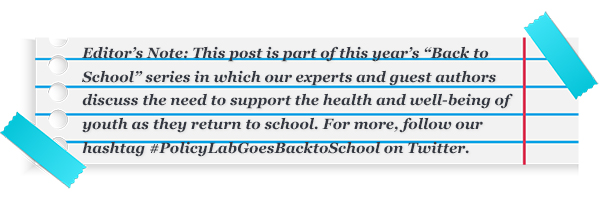Improving Access to Vision Care for Youth in Foster Care: We Can’t Lose Sight of This Fundamental Back-to-School Need


Ads for children’s back-to-school supplies are everywhere this time of year. While the notebooks and backpacks featured in these ads are important, they’re missing a critical need for some students: glasses.
Vision is tied to multiple aspects of well-being including physical, emotional, developmental, and social. Uncorrected vision problems among children can impair learning, participation in extra-curricular activities and social development.
Accessing glasses can be particularly challenging for youth in foster care. Undetected and undertreated health problems are common among children entering foster care, and they can experience unique health care access barriers during placement. Seeing the barriers children in foster care face firsthand as a clinician in Children’s Hospital of Philadelphia (CHOP)’s Fostering Health Program led our team to launch a new project aimed at ensuring our patients have access to the vision care they need.
Youth in Foster Care Face Unique Challenges to Accessing Vision Care
While caring for youth in the Fostering Health Program, we noticed that many children with abnormal vision screens did not have access to glasses. In research to further understand this issue, we reviewed the charts of 190 children seen at our clinic over a one-year period. Out of 55 patients with a documented history of needing glasses, only 12 (22%) had access to them. We performed eye chart vision screens for 120 patients and 71 (59%) were abnormal. Almost all youth with abnormal vision screens (66/71, 93%) did not have access to glasses.
We also noted that children in foster care face unique challenges in accessing vision care. Fragmented health care and schooling resulted in missed opportunities for routine vision screens. Some children reported their glasses did not transition with them as they entered foster care or moved placements. And caregivers, especially non-relative foster parents, reported being unaware that children in their care needed glasses.
Further, children in foster care are at increased risk for health problems that can be compounded by uncorrected vision issues, including academic delays and behavioral manifestations of trauma experiences such as hypervigilance.
A Coordinated Approach to Supporting Vision Care Needs
Our team, composed of Fostering Health Program and PolicyLab professionals, is excited to launch a project funded by the Warby Parker Impact Foundation aimed at helping children in foster care access the vision care they need.
As part of this project, patients of CHOP’s Fostering Health Program with abnormal vision screens will receive case management to help coordinate optometry visits, support with associated costs such as transportation, optometry exams and glasses, as well as help using technology to facilitate ordering glasses.
Multiple systems are involved in delivering care to children in foster care including health care, payors, courts and child welfare agencies. In tandem with implementation of additional care supports within the Fostering Health Program, we will take a multi-stakeholder approach to understand system-level barriers and opportunities for improving vision care and continuity of vision care for youth in foster care. This will inform the development of targeted educational materials and policy recommendations.
Additionally, we will evaluate the impacts of the clinical intervention on access to glasses and multiple domains of well-being. We are putting youth and caregivers at the center of this work, inviting intervention participants to share their experiences and insights in interviews. This information will be paired with assessment of outcomes such as time to receipt of glasses after abnormal vision screens.
It is always inspiring to hear the goals of children served by the Fostering Health Program. Many youth report long-term goals focused on careers that will allow them to help other children involved with foster care. In the short term, many would like to re-engage in their favorite activities such as sports and writing and connect with their siblings.
Helping youth in foster care access the glasses they need to learn, participate in the activities they love, interact with others, and recover from trauma experiences is an essential first step towards supporting these goals.
